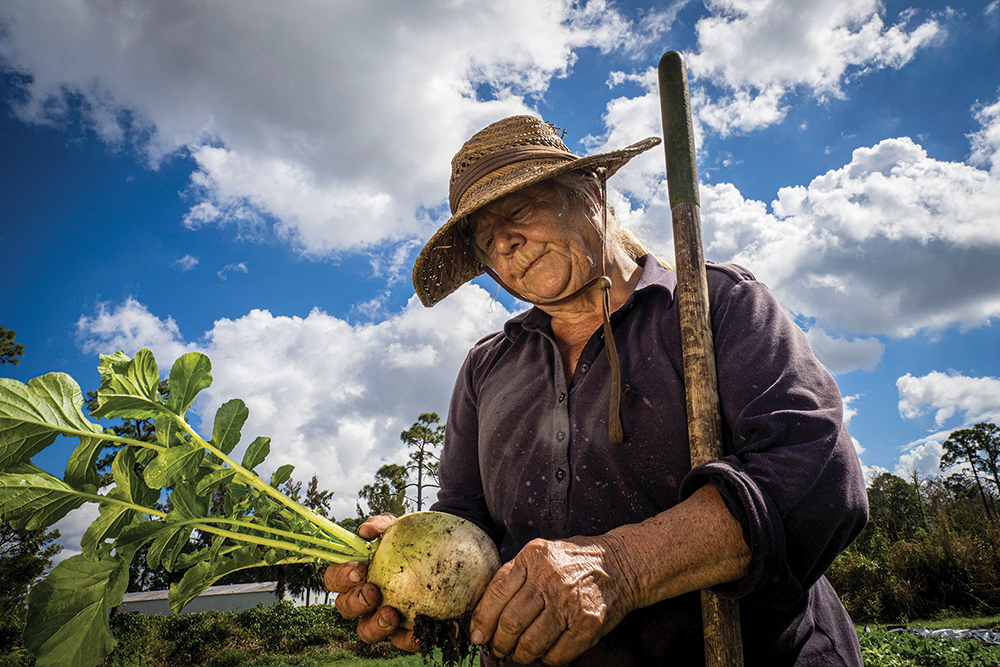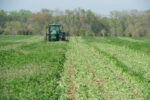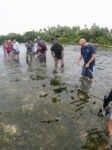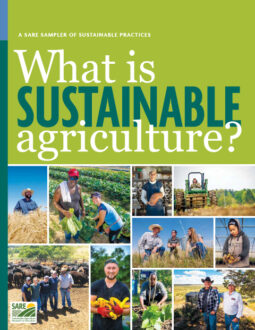Our food system is only sustainable when the health and wellbeing of all those involved in agriculture are taken into account. This means ensuring safe and reasonable workplace conditions for farmworkers, as well as fair compensation and benefits. Many farmers need things like better access to mental and physical health support, childcare and networking opportunities to deal with the stress and isolation of farm life.
Social Sustainability
The fourth episode in SARE’s “What is Sustainable Agriculture?” series introduces key components of social sustainability and illustrates strategies that can help farmers and ranchers succeed. “Social Sustainability” addresses the importance of human resilience, success and fulfillment in agriculture.
Sampler of Projects
Helping Farming Communities Cope with Stress and Suicide
SARE project ENC18-170
Farming is very stressful. From the long hours and the difficult, solitary nature of the work to the many risk factors that are largely beyond one’s control, farmers confront major mental health challenges that for many years were not talked about within agriculture. But today, farming communities are turning more attention to the issue of mental health and the high suicide rate in agriculture, one of the worst of any professions in the country. As one example, the Minnesota Department of Agriculture’s Meg Moynihan is working with a wide range of partner organizations to deliver training and resources on mental health topics to people who work with farmers in their local communities, including government staff, Extension educators and community leaders. Using a SARE Professional Development Program grant, Moynihan and her collaborators expanded on previous work by delivering seminars and workshops on the topics of stress among farm youth, supporting farmers who are under stress, navigating conflict and difficult conversations, and suicide prevention and bereavement.
Effectively Managing the Human Relationships on the Farm
SARE project ENE16-142
To be successful, farmers need a diverse set of skills in crop and livestock production, equipment operation and maintenance, marketing, and business management, among other areas. For many, though, a weak spot can be in the cultivation of healthy relationships with the people who play a role in the success of the operation: business partners, employees, family members and others. This prompted Leslie Forstadt, a University of Maine Cooperative Extension human development specialist, to develop a training program for agricultural service providers (ASP) to make them better able to support their farmer clients in the area of interpersonal skills. The project, funded by a SARE Professional Development Program grant, focused on four key areas: communication, decision making, goal setting and time management. The aim was not to make ASPs “experts” on these topics but rather to help them recognize when their clients are facing interpersonal challenges and then to guide them toward the skills they need to find a resolution.

Training for Black Farmers in Low-Income Urban Communities
SARE projects EDS20-15 and EDS18-07
HABESHA is a nonprofit organization in Atlanta seeking to improve food access, business and employment opportunities and health outcomes for low-income communities in urban areas. Through their HABESHA Works program, the nonprofit’s staff provides urban farm and garden training to Black adults with the goal of helping low-income communities produce their own fresh foods. HABESHA Executive Director Cashawn Myers used two SARE Research and Education grants to expand the capacity of HABESHA Works to train new farmers by incorporating an incubator farm into the program and creating a more advanced curriculum on leadership and business skills. The incubator allows trainees to gain basic farming skills in a low-risk, supportive environment. The advanced curriculum, called HALO, covers such topics as branding and marketing, financing, interpersonal skills and running an organic operation.
Tools and Training to Reduce Farmers’ Pesticide Risk
SARE project EW17-019
On a day to day basis, pesticides represent one of the most immediate risks to the health and safety of farmers and farmworkers. At the same time, their regular use can have a negative impact on nearby communities and the environment. Integrated pest management (IPM) programs within state Extension systems play a critical role in helping farmers reduce their use of pesticides and handle them safely. Using a SARE Professional Development Program grant, Oregon State University’s Paul Jepson and Katie Murray sought to improve the capacity of these IPM specialists to help farmers adopt safer pesticide protocols. Working with their peers in 11 other Western states, Jepson and Murray held workshops focused on pesticide risk assessment and education for agricultural professionals and organized monthly discussion topics. They also refined and shared a pesticide risk classification tool that will help farmers both in the United States and worldwide to begin moving away from highly hazardous pesticides and toward less harmful options.
Health and Wellbeing Resources
Information for farmers, ranchers, educators and researchers who are seeking to improve health and quality of life for producers, their families and our communities.

Managing Stress
Farming and ranching are stressful businesses. One key metric of a farm's sustainability is its capacity to provide a quality of life that meets one of our most basic human needs - good mental health. This page highlights successful SARE-funded projects that are using innovative strategies to help farmers and ranchers manage stress. If you […]
Health and Wellbeing
The agricultural profession is unique in the many ways it can influence health and wellbeing. For example, farming and ranching is oftentimes physically demanding and dangerous, and it can also be isolating and stressful. Success is often influenced by many things beyond a farmer’s control, from weather to markets to pest or disease outbreak, as […]

Understanding and Measuring Social Sustainability
This SARE brief defines social sustainability and illustrates how it can be addressed more clearly in SARE projects. Sample projects and quality of life indicators are provided to help grant-seekers and reviewers think broadly about understanding, measuring and describing the social impacts of research and education projects.
